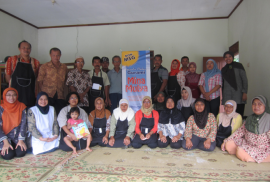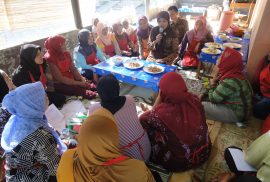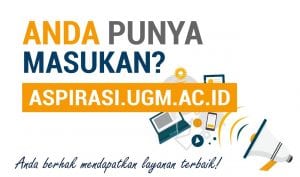Kelompok Pembudidaya Ikan “Mino Mulyo” berlokasi di Dukuh Kergan, Desa Tirtomulyo, Kecamatan Kretek, Kabupaten Bantul, dengan anggota sebanyak 35 orang. Kelompok ini sudah mendapatkan Sertifikat Cara Budi Daya Ikan yang Baik dengan nilai Baik, dari Dirjen Perikanan Budidaya pada tahun 2013. Desa Tirtomulyo, khususnya Dukuh Kergan, mulai menjadi perhatian karena terletak pada posisi yang strategis, pada jalur utama Yogyakarta-Samas atau sekitar 3 km dari yang direncanakan sebagai Jalur Lingkar Selatan. Adanya jalur ini memungkinkan dikembangkannya peluang usaha masyarakat, antara lain dalam bentuk Kompleks Wisata Kuliner untuk wilayah Kretek, khususnya di Dusun Kergan.
he “Mino Mulyo” Fish Cultivator Group is located in Kergan, Tirtomulyo, Kretek District, Bantul Regency, with 35 members. This group had received a Certificate of Good Fish Cultivation Methods with Good grades, from the Director General of Aquaculture in 2013. Tirtomulyo Village is starting to get attention because the location is in a strategic position, on the main route Yogyakarta-Samas or about 3 km of the planned Southern Ring Line. The existence of this route allows the development of community business opportunities, including in the form of a Culinary Tourism Complex for the Kretek area, especially in Kergan.
Ngentak in Poncosari, Bantul, Yogyakarta is located in a strategic position around Pantai Baru tourism area which has advantages including clean and shady beaches, as well as education-based ecotourism such as hatchling conservation, fisheries (shrimp ponds) and animal husbandry, and renewable energy. The “Ulam Arum Sari” , Agriculture Group, in Ngentak consists of 40 fisherwomen and fish cultivators whose main activity is to process and market fishery products in the form of culinary dishes and processed fishery products as souvenirs. The Team from Fisheries Product Technology Study Program, Faculty of Agriculture UGM conducts empowerment, training and mentoring activities for members of the KUB Ulam Arum Sari to improve skills in diversifying cultured shrimp processed that are not absorbed by the market (by product) or do not meet the criteria for shrimp raw material (rejected) market. This activity was carried out in June – October 2015 with a mentoring program in the form of socialization, application of appropriate technology in the production of various processed shrimp, packaging and labeling improvements, initiation of marketing and promotion strategies, simple business analysis training, games to increase group motivation, and monitoring. and evaluation. Skills development in the knowledge of the diversification of processed shrimp products is expected to increase the independence and welfare of the community in the target group in particular and ultimately be able to move the economic wheels of Ngentak Hamlet, Poncosari for the better









